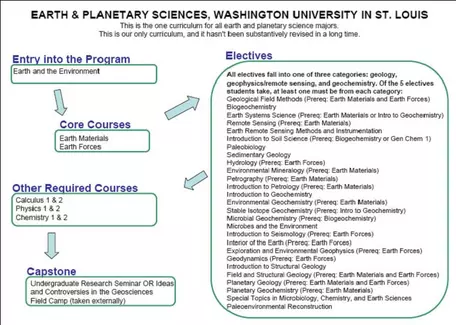Initial Publication Date: June 10, 2015
Earth & Planetary Sciences, Washington University in St. Louis
Information for this profile was provided by Jennifer Smith in 2009. Information is also available on the program website. Washington University in St. Louis is a university with graduate programs including doctoral programs . Students in this program are pursuing a Bachelors degree.
Program Design & Assessment
Overview
This is the one curriculum for all earth and planetary science majors. This is our only curriculum, and it hasn't been substantively revised in a long time.
Strengths of this program
The program is designed for flexibility; students can make the choice within the curriculum as to whether they would prefer a specific focus, or rather train more broadly.
Types of students served
Program Goals
The goals of this program are as follows:
Goal statement (from assessment report):
Implement a curriculum that trains majors in modern earth and planetary sciences, with emphases on analytical thinking, clear and concise speaking and writing, and competence in fieldwork and independent research.
The learning goals were informed by the following resources:
How program goals are assessed
Design features that allow goals to be met
Alumni Careers
Graduation rate
Careers pursued by our alumni
Courses and Sequencing
Diagram of course sequencing and requirements
 ×
×

×
Entry into the program
- Earth and the Environment
Core courses
- Earth Materials
- Earth Forces
Electives
All electives fall in to one of three categories; geology, geophysics/remote sensing, and geochemistry. Of the 5 electives students take, at least one must be from each category.- Geological Field Methods (Prerequisite: Earth Materials and Earth Forces)
- Biogeochemistry
- Earth Systems Science (Prerequisite: Earth Materials or Intro to Geochemistry)
- Remote Sensing (Prerequisite: Earth Materials)
- Earth's Atmosphere and Global Climate
- Surface Processes (Prerequisite: Earth Materials)
- Earth Remote Sensing Methods and Instrumentation
- Introduction to Soil Science (Prerequisite: Biogeochemistry or Gen Chem 1)
- Paleobiology
- Sedimentary Geology
- Hydrology (Prerequisite: Earth Forces)
- Environmental Mineralogy (Prerequisite: Earth Materials)
- Petrography (Prerequisite: Earth Materials)
- Introduction to Petrology (Prerequisite: Earth Materials)
- Introduction to Geochemistry
- Environmental Geochemistry (Prerequisite: Earth Materials)
- Stable Isotope Geochemistry (Prerequisite: Intro to Geochemistry)
- Microbial Geochemistry (Prerequisite: Biogeochemistry)
- Microbes and the Environment
- Introduction to Seismology (Prerequisite: Earth Forces)
- Interior of the Earth (Prerequisite: Earth Forces)
- Exploration and Environmental Geophysics (Prerequisite: Earth Forces)
- Geodynamics (Prerequisite: Earth Forces)
- Introduction to Structural Geology
- Field and Structural Geology (Prerequisite: Earth Materials and Earth Forces)
- Planetary Geology (Prerequisite: Earth Materials and Earth Forces)
- Planetary Geochemistry (Prerequisite: Earth Materials)
- Special Topics in Microbiology, Chemistry, and Earth Sciences
- Paleoenvironmental Reconstruction
Other required courses
- Calculus 1 & 2
- Physics 1 & 2
- Chemistry 1 & 2
Capstone
- Undergraduate Research Seminar OR Ideas and Controversies in the Geosciences
- Field Camp (taken externally)
Other key features of this program:
other key features